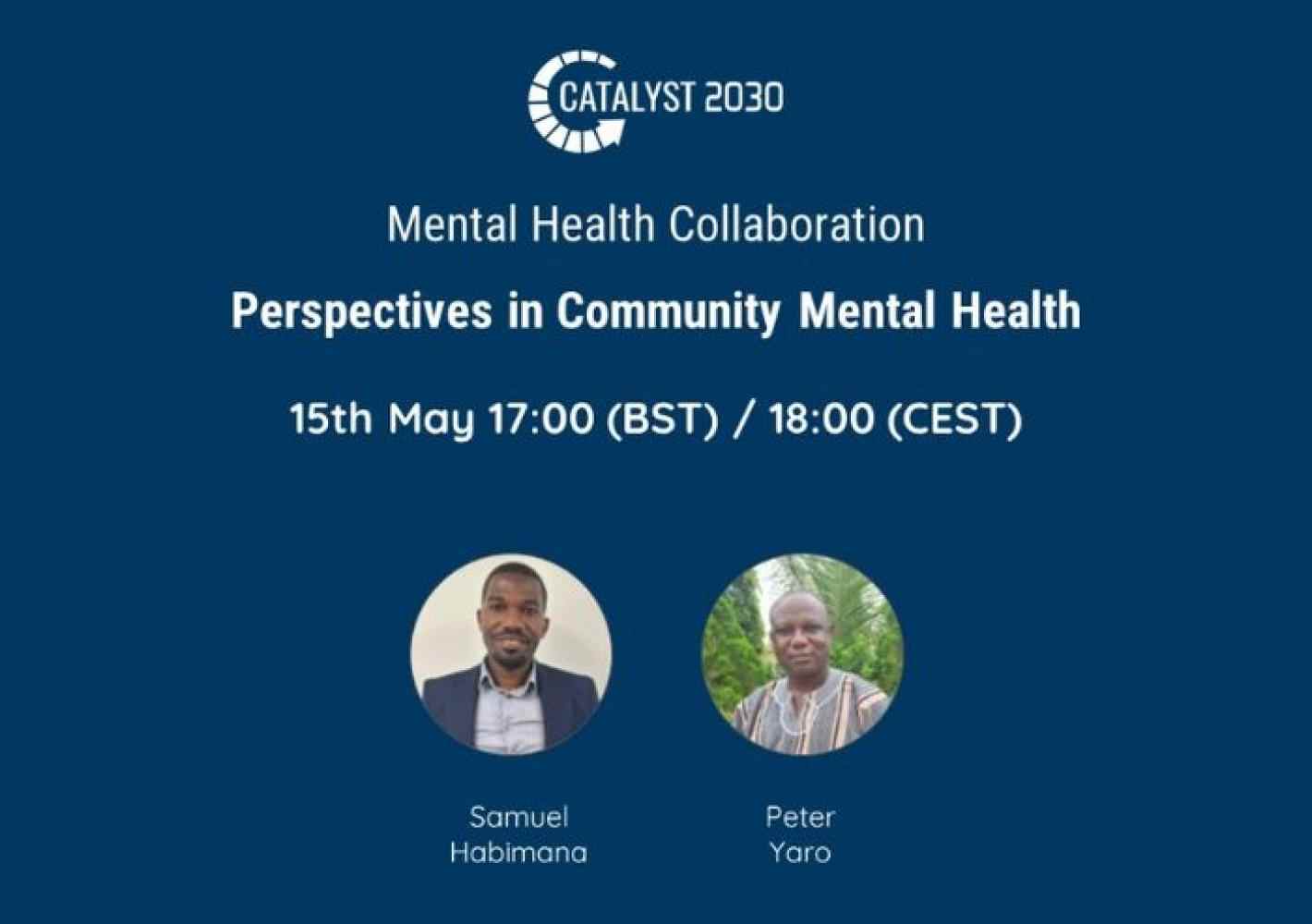
Catalyst 2030 Mental Health Collaboration: Perspectives in Community Mental Health
The Catalyst 2030: Mental Health Collaboration is hosting its next webinar on the 15th of May and it's set to be a great chance to discuss community mental health.
Community mental healthcare is quickly becoming a well-accepted pillar in developing effective public mental well-being measures. It encompasses the practices needed to promote mental health among a local population, ranging from ensuring mental health needs are addressed in an affordable, acceptable, and accessible manner, to developing community resilience for better wellbeing. Peter Yaro, the Executive Director for BasicsNeeds- Ghana will walk us through his organization’s work in empowering people with mental health issues to access community-oriented treatment. Samuel Habimana will join us with perspectives he draws on from the Community Resiliency Model and his work in Rwanda.
This is for Catalyst 2030 members - to join, please contact them.
About Catalyst 2030: Mental Health Collaboration
The Catalyst 2030: Mental Health Collaboration creates opportunities for global collaboration between funder networks and mental health social entrepreneurs with tangible tools and resources, to create a systemic impact.
The collaboration seeks to educate funders, social innovators, corporates, and policymakers, on the intersectionality of mental health with other social justice systems. These include gender, climate change, education, healthcare, etc., to enhance cross-sector collaborations to integrate mental health work into other social justice issues.
Speakers
Samuel Habimana is currently a Ph.D. candidate in Social Work and Social Ecology at Loma Linda University in California, with a focus on social welfare and social research. His doctoral research, under the guidance of Prof. Susanne Montgomery, Ph.D, explores the psycho-social factors influencing both survivors and perpetrators of the 1994 Rwandan Genocide against the Tutsi, particularly examining how the Community Resiliency Model can enhance resilience and social cohesion. He is also the Founder and Executive Director of the Rwanda Resilience and Grounding organization (www.rrgo.org) and works as a Research Assistant. Recently, Habimana was honored as the 2023 Ambassador of the Year by the Trauma Resource Institute, recognizing his impactful work on building resilience, compassion, and healing among highly traumatized populations in Rwanda. Habimana holds a master’s in public health and a bachelor’s in clinical psychology from the University of Rwanda. His expertise includes mental health care, public health, and managing drug addiction, with a special focus on fostering individuals' and communities’ resilience through nature-based solutions, the Community Resiliency Model (CRM), and laughter yoga.
A certified teacher in Community Resiliency Model skills, and laughter yoga ambassador Habimana also engages as an international consultant on various research projects, utilizing his skills in statistical and mapping software such as SPSS, SAS, ArcGIS, R, NVivo, and STATA. He has made significant academic contributions through presentations at both local and international conferences and appearances on Rwandan national television programs.
Peter Badimak Yaro is the Executive Director of BasicNeeds-Ghana. He is a social development worker and Public Mental Health specialist with over two decades of working experience. Peter is an experienced leader and manager who has been part of BasicNeeds-Ghana since 2004. He has Masters level academic and professional qualifications in Public Mental Health, International Mental Health Policy and Services, Sociology, and Linguistics.
Peter is a leading mental health advocate in Ghana and played an active role in the enactment of Ghana’s Mental Health law (Act 846) and the rollout of the National Mental Health Policy and Strategic Plan. He has been part of the WHO QualityRights rollout, serving as a trainer and coach. Peter is a member of the Catalyst2030 Mental Health Collaboration.